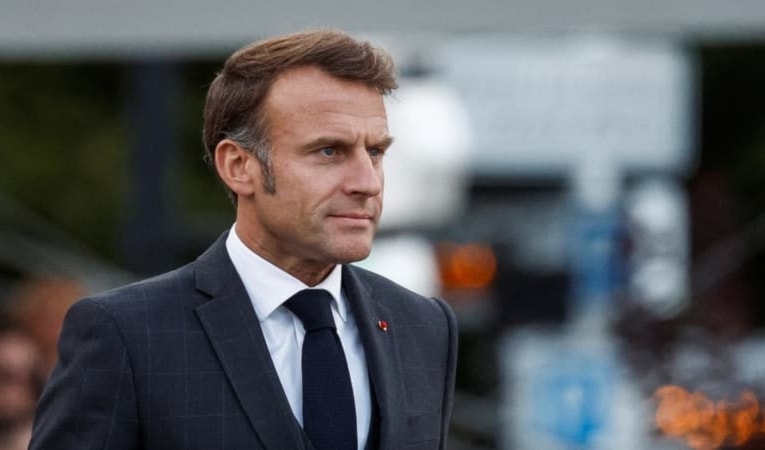French parliament to consider resolution on Macron's impeachment
French President Macron would immediately resign if the resolution is approved by the National Assembly's lower and upper houses.
-

French President Emmanuel Macron attends a ceremony to commemorate the 80th anniversary of the liberation of the port city of Le Havre during World War II, in northern France, on September 12, 2024. (AFP)
The National Assembly, the French parliament's lower house, will consider a resolution concerning the impeachment of President Emmanuel Macron, proposed by the left-wing La France Insoumise group on Tuesday.
The initiative was put forth after Macron ruled out the left's participation in the government formation, despite the coalition emerging victorious in the recent parliamentary elections held in July.
The resolution is in accordance with Article 68 of the constitution, allowing the possible removal of the president from power if he violates his duties.
The proposal was supported by 81 members of the left-wing New Popular Front (NPF) alliance, including 72 lawmakers from the La France Insoumise party, along with support from the Greens and several other parliament members from the Left Democrats and Republicans group.
The resolution's proceedings
The admissibility of the initiative is decided by the country's highest body of the lower house of parliament, the Bureau. Left parties currently represent 12 of the executive committee's 22 members.
In contrast to the left coalitions, the Social Party refused to support the initiative, while prominent French politicians, including former president and National Assembly member Francois Hollande and leader of the Greens, Marine Tondelier, publicly opposed it.
After passing this stage, the initiative must be approved by the legislative commotion of 73 lawmakers, where the left only has 24 seats. After this process, it needs to be approved by a two-thirds majority of the National Assembly (385 parliamentarians) within a two-week period. These two stages must be passed under the French parliament's upper house, the Senate, where the left lacks a majority.
If the text is endorsed by the Senate (232 votes), both chambers will convene in a joint meeting. The resolution must then be supported by 617 of the 925 parliamentarians from the two assemblies, resulting in the president's immediate resignation.
In 2016, the Bureau deemed a similar resolution on the impeachment of Hollande unacceptable.
Protests sweep France as Macron appoints Barnier PM
Thousands of protesters took to the streets across France on September 7, objecting to President Macron's controversial decision to appoint center-right Michel Barnier as prime minister.
The move sparked outrage among left-wing parties, which accused Macron of ignoring the results of the legislative election, where the New Popular Front alliance, a coalition of left-wing parties, came out on top.
Despite this, Macron named Barnier, a 73-year-old conservative and former Brexit negotiator, to lead the government, following a two-month search after the election led to a hung parliament.
Barnier's appointment was criticized as undemocratic by the left, with La France Insoumise leading calls for mass protests.
Demonstrations were held in over 130 locations across France, and unions and student bodies signaled further action, including possible strikes set for October 1.
Polling conducted by Elabe showed that 74% of French citizens believed Macron had disregarded the election results, with 55% accusing him of "stealing" the election.
In his first interview as prime minister, Barnier indicated that his government would include conservatives, members of Macron's camp, and potentially some from the left.
However, his position is precarious, as both the left-wing NFP and the far-right National Rally (RN) could join forces to pass a no-confidence vote and oust him, given their combined majority in parliament.

 4 Min Read
4 Min Read








